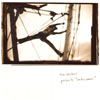 I love music that forms images in my mind because the transformation from one medium to the next seems so mysterious to me. That a musician can turn sound into the most vivid photograph ever without defaulting to the ease of field recordings seems a metaphysical conundrum, but some are quite good at it and others are veritable masters of the process. Tim Hecker may be the finest sonic photographer around, the rerelease of Radio Amor being further evidence for this claim.
I love music that forms images in my mind because the transformation from one medium to the next seems so mysterious to me. That a musician can turn sound into the most vivid photograph ever without defaulting to the ease of field recordings seems a metaphysical conundrum, but some are quite good at it and others are veritable masters of the process. Tim Hecker may be the finest sonic photographer around, the rerelease of Radio Amor being further evidence for this claim.
Alien8
Mille Plateaux released Radio Amor in 2002 amid a string of other Hecker recordings. It was not his only 2002 release, but some well-read publications gave it special attention and recognized Hecker's unique approach to sound and music. That recognition led to Radio Amor becoming mostly unavailable, out of print since some time in 2005. Hecker undoubtedly has a larger audience now. His music is becoming more pervasive and more people are looking back from Harmony in Ultraviolet and wondering where all this music came from. The best place to look would be on this album thankfully made available again by Alien8. Hecker's effortless, soporific mannerisms are in tact on Radio Amor but perhaps less refined, still in incubation and developing. Typically such a fact might be taken to speak poorly for a record, as though Mirages and Harmony in Ultraviolet are superior records because they exhibit a more sophisticated attention to detail or highlight a progression from earlier material. Hecker has been making music for a long time, however, and I think his continued growth speaks volumes about his art. Radio Amor may seem more simple, but its emotive depth does not suffer for that fact and, in addition, the chance to hear Hecker playing with more concrete melodies and structures is a lot of fun.
Evidently Radio Amor was composed with the work of a fishing vessel in mind, the body of a man moving about in the rigging and going about his work for the day. I'll have to admit that this was not the first image that came to mind when listening to these songs. I did, however, imagine floating in the air and finding myself lost among the clouds. Hecker's music is so strongly photographic that I have a difficult time describing it in any terms other than visual ones. When the music stutters near the end of "Spectral," I can only think of lightning radiating over the surface of the globe and as "I'm Transmitting Tonight" begins, a sudden plunge into the ocean seems inescapable, the slow motion of traveling underwater the firmest description I can proffer. Objectively, the music on Radio Amor is more concrete, there is a definite sharpness to these songs that I don't feel on Harmony in Ultraviolet and that Mirages had only fleetingly. The sounds move in well-defined blocks, heavy on the ears at times and distinct in memory. It's quite clear that each fragment of sound represents a frame or small series of frames from a much larger movie. When "7000 Miles" plays and the sound of wind and singing sand begins it's as though the entire visual project is being smeared about with impressionistic strokes: it is a stunningly fluid piece on a record that feels tightly structured and constructed from very solid, almost recognizable instruments.
The whole thing ends rather suddenly, but that may have more to do with Hecker's hypnotic powers than with any flaw on the record. After being drawn into the music's warm center, the sudden ejection from that place seems a little cruel and unexpected. "Trade Winds, White Heat," the album's closing piece, is an especially calm and extended moment, a loud and layered mass of easy drone pitched back and forth melodically, the fuzz of a radio signaling its final moments. With the transmission ended the room seems far quieter, tiny sounds are more obvious, and the simple joy of being temporarily motionless hangs in the air.
Samples can be found here.
Read More

